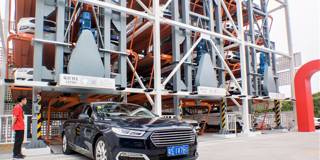Now that it has risen to the top of the global economy, China must adopt the necessary reforms to become fully compliant with the international rules that it accepted upon joining the World Trade Organization in 2001. Its current policy will only lead to a serious trade conflict with the US.
CAMBRIDGE – I am a great admirer of China and its ability to adjust its economic policies to maintain rapid growth. But now that it has risen to the top of the global economy, it must adopt the necessary reforms to become fully compliant with the international rules that it accepted upon joining the World Trade Organization in 2001.
When I first went to China in 1982, it was a very poor country governed by a thoroughly communist regime. Agriculture was completely collectivized. Because peasants had lost the right to farm their own land, agricultural output was extremely low. Beyond agriculture, individual ownership of the means of production was outlawed. A Chinese family could own a sewing machine for its own use, but it could not own two sewing machines or hire a neighbor to help produce garments.
Under the leadership of Deng Xiaoping, this began to change. Plots of land were returned to their previous owners, who were allowed to keep any output exceeding the government’s mandatory quota. As a result, agricultural output soared, and farmers produced a range of additional crops, like flowers and vegetables, to sell directly to the public. Restrictions on ownership of productive assets and on hiring workers were gradually relaxed, such that the private sector now accounts for the majority of economic activity in China.

CAMBRIDGE – I am a great admirer of China and its ability to adjust its economic policies to maintain rapid growth. But now that it has risen to the top of the global economy, it must adopt the necessary reforms to become fully compliant with the international rules that it accepted upon joining the World Trade Organization in 2001.
When I first went to China in 1982, it was a very poor country governed by a thoroughly communist regime. Agriculture was completely collectivized. Because peasants had lost the right to farm their own land, agricultural output was extremely low. Beyond agriculture, individual ownership of the means of production was outlawed. A Chinese family could own a sewing machine for its own use, but it could not own two sewing machines or hire a neighbor to help produce garments.
Under the leadership of Deng Xiaoping, this began to change. Plots of land were returned to their previous owners, who were allowed to keep any output exceeding the government’s mandatory quota. As a result, agricultural output soared, and farmers produced a range of additional crops, like flowers and vegetables, to sell directly to the public. Restrictions on ownership of productive assets and on hiring workers were gradually relaxed, such that the private sector now accounts for the majority of economic activity in China.